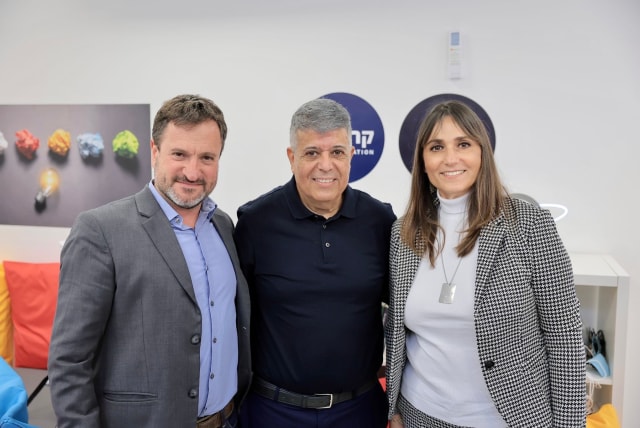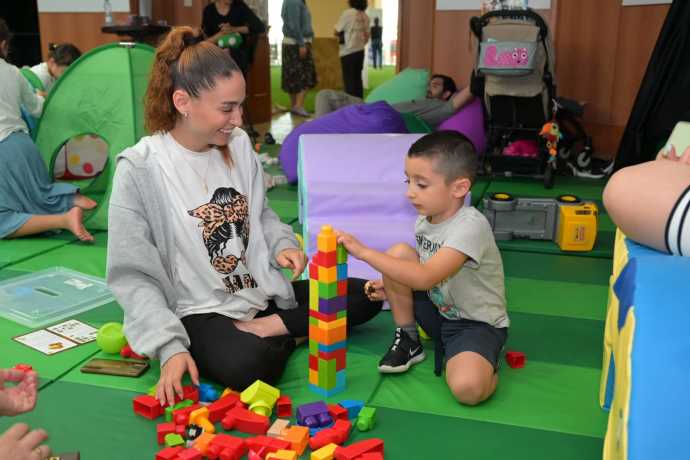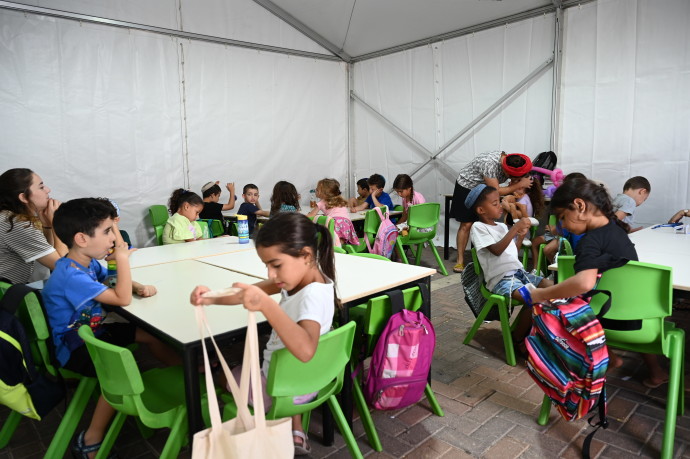Reviving Israel’s periphery

Rashi Foundation CEO Michal Cohen on revitalizing war-torn communities
‘Immediately from October 7, a shock wave shot through the State of Israel,” says Michal Cohen, CEO of the Rashi Foundation. “Civil society was working in an unprecedented vacuum in the first month to manage the social catastrophe.”
In the massacre’s wake, countless NGOs in Israel went into overdrive to help the evacuees, but few were as well equipped to deal with the social crisis as the Rashi Foundation. Founded in 1984, the foundation drives social mobility and equal opportunity in Israel’s geosocial periphery, focusing on the education, employment and social welfare systems, from cradle to career. Rashi has “boots on the ground” through its eight affiliated nonprofit organizations that create opportunities for those living in Israel’s periphery. It also has partners from around the world who collaborate with the foundation.
Rashi Foundation board member Elena Gabay notes, “Philanthropy plays a crucial role in society, particularly during times of crisis. During this war, Rashi was one of the first organizations in the field providing support during Israel’s darkest hour, bringing flexible and effective solutions to the evacuees.”
Three days after the war started, Cohen and her team from the Rashi Foundation traveled to the Dead Sea and visited evacuees from the South who had begun to arrive at the hotels in the area. “At that time,” recalls Cohen, “there was a feeling of chaos, that no one was in charge. The evacuees had been brought to the hotels, and the children running around the lobby were like refugees.”
One of the evacuees who works at the foundation urged Rashi to create a structured program for the children staying at the various hotels. Cohen and her staff immediately began to provide an organized response for the children. At the Nevo Hotel, for example, where evacuees from Kibbutz Sa’ad were housed, Rashi assisted in creating a school for the children. With the assistance of volunteers from Rashi, the school was quickly organized, and the kibbutz members themselves began to operate the school. Educational centers were also established in other locations, such as Eilat, Tiberias, and Nof Hagalil.
Through its affiliates, Rashi has deployed 2,500 volunteers since the beginning of the war to assist evacuees from Israel’s South and northern areas. Cohen explains that the foundation has worked in tandem with the municipalities that have been forced to evacuate their residents from their homes, as well as with those that have received the evacuees. This includes Sderot, Ofakim, Netivot, Kiryat Shmona, Nof Hagalil, and Eilat.
“We asked the municipalities what they needed – not what we wanted to give them but what they required,” says Cohen. “This also illustrates the unique nature of the Rashi Foundation. We have decades of experience working with the municipalities, not only during emergencies.”
Cohen explains that the Rashi Foundation is working now on long-term plans with the municipalities in Israel’s periphery, using its expertise to craft strategic plans for the next three years. “We are bringing funds, partners, and our knowledge,” she says. “We don’t tell them what they need. We build the outline together with them, which must be tailored to their needs. It is also important that it doesn’t overlap with other existing investments and projects.”The communities affected by the war have asked for assistance from Rashi in four main areas: education; employment and economic development; strengthening local leadership; and building community resilience.
In education, the Rashi Foundation is working to integrate formal with experiential education and promote excellence and skills needed for success in the 21st century.
Cohen says that the experiential education programs will help heal and strengthen the resilience of students who have been affected by the traumas of the war. Adolescents, she explains, prefer group sessions over one-on-one therapy, and it is for this reason that Rashi is developing group activities in a workshop-type format. Cohen, who served as the Education Ministry’s director-general for four years, says that the development of Israel’s youth following the war and its accompanying traumas will be one of the central challenges facing Israel in the coming years.
Another example cited by Cohen is the “campuses” program in Ofakim created with the Rashi Foundation, where every student in the city goes out at least once a week during school hours to participate in extracurricular activities in sports, music, art, and more. These activities strengthen their individual abilities while also providing social and therapeutic support through group work. They allow students to be with their peers who have had similar experiences and to talk about them together.
The Rashi Foundation plans to expand these experiential activities to six communities in the country’s South and North to reach between 15,000 and 20,000 children and youth.
An example of how formal and informal education intersect in this challenging time, Cohen continues, relates to the bagrut (matriculation exams) administered in high schools. She explains that in Ofakim, students who have been unable to study for much of the year due to the war did not feel comfortable going to class to prepare for the exams. In response, the Rashi Foundation and its partner Cisco Israel set up a unique youth center dubbed The Magnet, where students can study in an informal atmosphere while preparing for their formal matriculation exams.
Communities that have been affected by the war, she says, must develop an awareness of the traumas that their residents – including children, youth, and young adults – have experienced. “Now the entire thinking of the community must be responsive to post-trauma,” she adds.
The war has directly influenced the second area of Rashi’s focus – employment and economic development. Since Oct. 7, many residents have been forced to leave their jobs or go on unpaid leave, businesses have been closed, and companies have reduced their workforce. In order to enable the residents to reintegrate into the labor market, there is a need to build a plan to promote quality employment.
To address this need, the Rashi Foundation is designing a system for placement-oriented training for young adults aged 25-35, as well as vocational guidance and improvement of digital and other work skills. In addition, it promotes collaboration with employers to create career opportunities, spurring economic development.
Cohen explains that the municipalities in Israel’s periphery that have been affected by the war no longer use the term “rehabilitation” but instead are focusing on boosting their growth. “We are speaking about these things,” says Cohen, “because this is what the municipalities are interested in. They realize that their cities need to become even more attractive than they were before October 7 so that the residents who have been evacuated will return. The municipalities tell us that they cannot return to the way things were, but rather they are saying, ‘We must provide a better response to our residents, and we must provide more significant employment opportunities.’
The war zone communities have come to the understanding that they must take the initiative, says Cohen. “They realize that from now on, they are the ones who must be responsible for their residents and cities as they were right after the massacre.”
Finally, adds Cohen, the Rashi Foundation is working to strengthen local leadership in communities in Israel’s periphery, which is key in order for them to be effective, to be self-sustaining, and to enable them to thrive from within. She cites Sderot as an example of a city with excellent local leadership that has managed to support its residents – both the vast majority of whom were evacuated, as well as those who chose to remain in the city. “We have been working intensively in Sderot for the past five years,” she says, adding that “it is clear that professional leadership provides better services for its citizens in routine times, as well as emergency situations such as wartime.”
Cohen says that the war has permanently changed how the communities of Israel’s periphery will act. “How they cope will depend on their strength. They will develop stronger leadership and are saying, ‘If we are not for ourselves, who will be?’ They must rely on themselves, invest in growth, leadership, and development, and manage all aspects of their lives. They are now talking about developing regional employment to entice their populations to remain. They will establish their own economic centers for prosperity, they will take the lead and will no longer be led by others.”
Cohen pays tribute to Rashi’s partners who enable the foundation to create and scale up their activities. Moving forward, she affirms that together with its partners, Rashi will continue to increase the scope and scale of its activities in strengthening recovery, resilience, and growth in Israel’s periphery.
This article was written in cooperation with the Rashi Foundation.
Jerusalem Post Store
`; document.getElementById("linkPremium").innerHTML = cont; var divWithLink = document.getElementById("premium-link"); if (divWithLink !== null && divWithLink !== 'undefined') { divWithLink.style.border = "solid 1px #cb0f3e"; divWithLink.style.textAlign = "center"; divWithLink.style.marginBottom = "15px"; divWithLink.style.marginTop = "15px"; divWithLink.style.width = "100%"; divWithLink.style.backgroundColor = "#122952"; divWithLink.style.color = "#ffffff"; divWithLink.style.lineHeight = "1.5"; } } (function (v, i) { });


